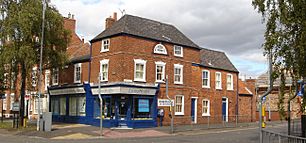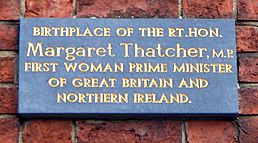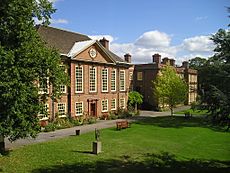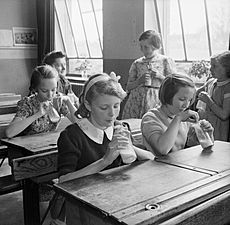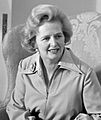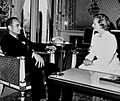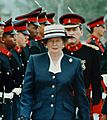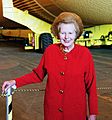Margaret Thatcher facts for kids
Quick facts for kids
The Baroness Thatcher
|
|||||||||||||||||||||
|---|---|---|---|---|---|---|---|---|---|---|---|---|---|---|---|---|---|---|---|---|---|
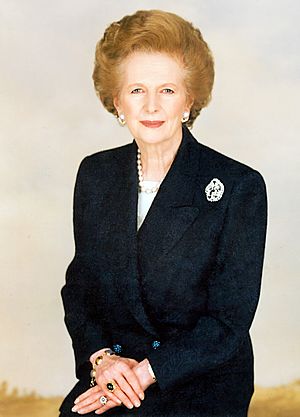
Studio portrait, c. 1995–96
|
|||||||||||||||||||||
| Prime Minister of the United Kingdom | |||||||||||||||||||||
| In office 4 May 1979 – 28 November 1990 |
|||||||||||||||||||||
| Monarch | Elizabeth II | ||||||||||||||||||||
| Deputy | Geoffrey Howe (1989–90) | ||||||||||||||||||||
| Preceded by | James Callaghan | ||||||||||||||||||||
| Succeeded by | John Major | ||||||||||||||||||||
| Leader of the Opposition | |||||||||||||||||||||
| In office 11 February 1975 – 4 May 1979 |
|||||||||||||||||||||
| Monarch | Elizabeth II | ||||||||||||||||||||
| Prime Minister |
|
||||||||||||||||||||
| Deputy | William Whitelaw | ||||||||||||||||||||
| Preceded by | Edward Heath | ||||||||||||||||||||
| Succeeded by | James Callaghan | ||||||||||||||||||||
| Leader of the Conservative Party | |||||||||||||||||||||
| In office 11 February 1975 – 28 November 1990 |
|||||||||||||||||||||
| Deputy | The Viscount Whitelaw | ||||||||||||||||||||
| Chairman |
See list
|
||||||||||||||||||||
| Preceded by | Edward Heath | ||||||||||||||||||||
| Succeeded by | John Major | ||||||||||||||||||||
|
|||||||||||||||||||||
|
|||||||||||||||||||||
|
|||||||||||||||||||||
| Personal details | |||||||||||||||||||||
| Born |
Margaret Hilda Roberts
13 October 1925 Grantham, England |
||||||||||||||||||||
| Died | 8 April 2013 (aged 87) London, England |
||||||||||||||||||||
| Resting place | Royal Hospital Chelsea 51°29′21″N 0°09′22″W / 51.489057°N 0.156195°W |
||||||||||||||||||||
| Political party | Conservative | ||||||||||||||||||||
| Spouse | |||||||||||||||||||||
| Children |
|
||||||||||||||||||||
| Parent |
|
||||||||||||||||||||
| Education | Kesteven and Grantham Girls' School | ||||||||||||||||||||
| Alma mater |
|
||||||||||||||||||||
| Occupation | |||||||||||||||||||||
| Awards | List of honours | ||||||||||||||||||||
| Signature | |||||||||||||||||||||
Margaret Hilda Thatcher (born Margaret Roberts; 13 October 1925 – 8 April 2013) was a British politician. She served as the Prime Minister of the United Kingdom from 1979 to 1990. She was also the Leader of the Conservative Party from 1975 to 1990.
Margaret Thatcher was the first female British prime minister. She was also the longest-serving British prime minister of the 20th century. As prime minister, she introduced new economic policies. These policies became known as Thatcherism. A Soviet journalist gave her the nickname "Iron Lady". This name stuck because of her strong and determined leadership style.
Thatcher studied chemistry at Somerville College, Oxford. She worked briefly as a research chemist before becoming a barrister (a type of lawyer). In 1959, she was elected as a Member of Parliament for Finchley. She later became the Secretary of State for Education and Science in 1970. In 1975, she became the Leader of the Opposition. She was the first woman to lead a major political party in the United Kingdom.
After winning the 1979 general election, Thatcher became prime minister. She introduced economic policies to reduce high inflation and improve Britain's economy. Her ideas focused on reducing government control (deregulation), selling off state-owned companies (privatisation), and limiting the power of trade unions.
Her popularity dropped at first due to a recession and rising unemployment. However, Britain's victory in the 1982 Falklands War and an improving economy brought back public support. This led to her re-election in 1983. She won a third term in 1987. But a new local tax, the "poll tax," became very unpopular. Her views on the European Economic Community also caused disagreements within her government. She resigned in 1990 after a challenge to her leadership. John Major became the new prime minister.
After leaving Parliament in 1992, she became Baroness Thatcher, a life peer in the House of Lords. She died from a stroke in 2013 at the age of 87. Margaret Thatcher is seen as a very important figure in British politics. Her time as prime minister changed Britain's economic and political direction.
Early Life and Education
|
Birthplace in Grantham
2009 photograph of her father's former shop
Commemorative plaque
Margaret and her elder sister were raised in the bottom of two flats on North Parade.
|
Childhood and School Days (1925–1943)
Margaret Hilda Roberts was born on 13 October 1925 in Grantham, England. Her parents were Alfred Roberts and Beatrice Ethel Stephenson. Her father owned a shop and was also a local politician. He raised Margaret and her older sister Muriel as strict Methodists.
Margaret grew up helping in her father's grocery shop. In 1938, before World War II, her family briefly gave shelter to a Jewish teenage girl. This girl had escaped from Nazi Germany. Margaret and her sister saved their pocket money to help pay for the girl's journey.
Margaret attended Huntingtower Road Primary School. She then won a scholarship to Kesteven and Grantham Girls' School. Her school reports showed she worked hard and always improved. She was the head girl in her final year. During World War II, she volunteered as a fire watcher.
In 1943, Margaret was accepted to study chemistry at Somerville College, Oxford. This was a women's college. She started her studies there in October 1943.
University Life at Oxford (1943–1947)
Margaret Roberts graduated from Oxford in 1947 with a degree in chemistry. She focused on X-ray crystallography. She also earned a Master of Arts degree in 1950. Even though she studied chemistry, she was already thinking about a career in law and politics. She was very proud to be the first prime minister with a science degree.
While at Oxford, Margaret was known for being serious and focused. She became President of the Oxford University Conservative Association in 1946. She was influenced by political books that argued against too much government control.
Starting Her Career (1947–1951)
After university, Margaret worked as a research chemist for a company called BX Plastics. In 1948, she applied for a job at ICI but was not hired. She then worked for J. Lyons and Co., helping to develop ingredients for ice cream.
She joined the local Conservative Association. In 1948, she attended a party conference. She was chosen as a Conservative candidate for Dartford in 1950. At a dinner, she met Denis Thatcher, a successful businessman. They married in December 1951. Denis supported her studies to become a lawyer. She qualified as a barrister in 1953. Later that year, their twins, Carol and Mark, were born.
Early Political Journey
Becoming a Member of Parliament (1959–1970)
In the 1950 and 1951 general elections, Margaret Thatcher ran for the Conservative Party in Dartford. She lost both times but showed great determination. She was the youngest and only female Conservative candidate at the time.
After taking a break for her young children, Thatcher was selected as the candidate for Finchley in 1958. She was elected as a Member of Parliament (MP) for Finchley in the 1959 election. Her first speech in Parliament was about making local council meetings open to the public. This idea became law.
In 1961, she was promoted to a junior government role as Parliamentary Secretary to the Ministry for Pensions. She was the youngest woman to hold such a position. After the Conservatives lost the 1964 election, she became a spokeswoman on housing. She supported the policy of allowing people to buy their council houses. In 1966, she moved to the Shadow Treasury team. She argued against government controls on prices and incomes.
In 1967, she visited the United States to meet political figures and learn about economic issues. After this trip, she was appointed to the Shadow Cabinet. She became the spokeswoman for fuel and power, and later for transport and education.
Education Secretary (1970–1974)
When the Conservative Party won the 1970 general election, Margaret Thatcher was appointed Secretary of State for Education and Science. One of her first actions was to stop a policy that forced schools to become comprehensive. She believed schools should be chosen based on educational reasons, not just one type of school.
During her time as Education Secretary, she faced criticism for cutting public spending on education. This included ending free milk for schoolchildren aged seven to eleven. She argued that few children would suffer and that younger children would still receive milk. This decision led to her being nicknamed "Margaret Thatcher, Milk Snatcher." She later said this experience taught her a valuable lesson about politics.
Leader of the Opposition (1975–1979)
After the Conservatives lost the 1974 elections, their leader, Edward Heath, faced challenges. Margaret Thatcher became the main challenger. She promised a fresh start for the party. In 1975, she defeated Heath to become the Conservative Party leader and Leader of the Opposition. She was the first woman to lead a major political party in Britain.
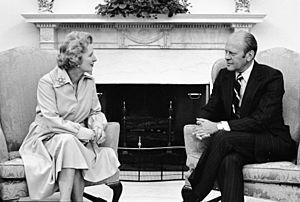
Thatcher worked on improving her public speaking. She also became more involved with the Institute of Economic Affairs, a think tank that promoted ideas like less government and lower taxes. She believed these ideas would make Britain stronger.
She traveled to the United States in 1975 and 1977, meeting Presidents Gerald Ford and Jimmy Carter. These trips helped her build an international profile.
In the late 1970s, Britain faced economic problems and widespread strikes, known as the "Winter of Discontent". The Conservatives used the slogan "Labour Isn't Working" to criticize the government. In 1979, a general election was called. The Conservatives won, and Margaret Thatcher became the first female British prime minister.
Prime Minister of the United Kingdom (1979–1990)
Margaret Thatcher became prime minister on 4 May 1979. She arrived at 10 Downing Street and spoke about bringing harmony, truth, faith, and hope. Throughout the 1980s, she was often called the most powerful woman in the world.
Economic Changes and Taxation
Thatcher's economic policies were influenced by ideas like monetarism. With her first finance minister, Geoffrey Howe, she reduced direct taxes on income. She increased indirect taxes instead. She also raised interest rates to control inflation and cut public spending.
Her policies faced opposition, especially from some members of her own party. Her approval ratings dropped. However, by 1982, the economy began to recover. Inflation decreased, but unemployment remained high. By 1983, the economy was growing stronger.
Thatcher believed in reducing the government's role in the economy. She famously said that "the state has no source of money other than money which people earn themselves." By 1987, unemployment was falling, and the economy was stable. This led to her re-election for a third term.
One of her most unpopular policies was the Community Charge, also known as the "poll tax." This new tax meant everyone paid the same amount, regardless of their income. It led to large protests and riots in London in March 1990. The tax was later removed by her successor.
Industrial Relations
Thatcher believed that trade unions had too much power. She wanted to reduce their influence. Several unions went on strike against her new laws, but their resistance eventually failed.
The miners' strike of 1984–85 was a major conflict. The National Coal Board planned to close mines and cut jobs. Miners went on strike, but their leader refused to hold a vote on the strike, making it illegal. Thatcher refused to give in to the union's demands. She compared the miners' dispute to the Falklands War. After a year, the miners' union ended the strike without a deal. Many coal mines were closed, leading to job losses and affecting entire communities.
Thatcher's strong approach led to a big drop in strikes across the UK. The number of working days lost to strikes fell significantly during her time in office.
Selling State-Owned Companies (Privatisation)
A key part of Thatcher's policy was privatisation. This meant selling off state-owned industries to private companies. After the 1983 election, this process sped up. Over £29 billion was raised from selling nationalised industries. Another £18 billion came from selling council houses.
The sale of council houses allowed over a million families to buy their homes. This increased the number of homeowners. Privatisation often led to improvements in how these industries performed. While some privatised companies did well, the results were mixed.
Thatcher was initially against privatising British Rail. However, she later accepted the idea, and her successor carried it out. She also supported financial deregulation, which removed many rules on the London Stock Exchange.
Northern Ireland
In 1980 and 1981, prisoners in Northern Ireland went on hunger strike. They wanted to regain their status as political prisoners. Thatcher refused to grant them this status, stating, "Crime is crime is crime; it is not political." After ten prisoners died, the strike ended. Some rights were restored, but not official political status.
Thatcher narrowly escaped an assassination attempt by the Provisional Irish Republican Army (IRA) in Brighton in October 1984. Five people were killed. Thatcher insisted that the Conservative Party conference should continue as planned the next day. Her calm response gained her public support.
In 1985, Thatcher signed the Anglo-Irish Agreement with the Irish prime minister. This agreement gave the Republic of Ireland an advisory role in Northern Ireland's governance. This caused protests from some Unionists in Northern Ireland.
Foreign Affairs
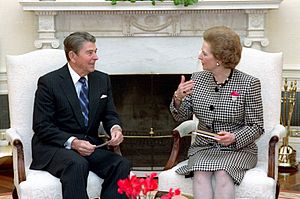
Thatcher's first foreign policy challenge was the 1979 Soviet invasion of Afghanistan. She condemned the invasion and supported a boycott of the 1980 Moscow Olympics. She also worked with the US to support Afghan fighters.
Thatcher formed a strong bond with US President Ronald Reagan. They shared a distrust of communism. She supported NATO's decision to place US nuclear missiles in Western Europe. She also allowed US planes to use British bases for the bombing of Libya in 1986.
She was one of the first Western leaders to respond positively to the Soviet leader Mikhail Gorbachev. She visited the Soviet Union in 1984. She later said that the world was entering a "new relationship" beyond the Cold War.
In August 1990, Iraqi leader Saddam Hussein invaded Kuwait. Thatcher urged US President George H. W. Bush to intervene. She famously told him, "This was no time to go wobbly!" Her government sent forces to the international coalition before the Gulf War began.
Falklands War (1982)
On 2 April 1982, Argentina invaded the Falkland Islands and South Georgia. This started the Falklands War. Thatcher quickly formed a special War Cabinet. She sent a naval task force to retake the islands.
Argentina surrendered on 14 June. The operation was a success, but 255 British servicemen died. Thatcher was praised for her strong leadership during the war. The "Falklands factor" helped her win the 1983 general election.
Negotiating Hong Kong
In 1982, Thatcher visited China to discuss the future of Hong Kong. China wanted to regain control of Hong Kong after 1997. Thatcher wanted Britain to keep a presence there. However, China insisted on its sovereignty. After two years of talks, Thatcher signed the Sino-British Joint Declaration in 1984. This agreement handed Hong Kong's sovereignty to China in 1997.
Apartheid in South Africa
Thatcher opposed sanctions against South Africa due to apartheid. She tried to persuade the South African government to end apartheid while maintaining trade. She invited President Botha to visit the UK in 1984. She also called the African National Congress (ANC) a "typical terrorist organisation." However, Nelson Mandela later praised Thatcher for being an "enemy of apartheid."
Europe
Thatcher supported Britain's membership in the European Economic Community (EEC). However, she believed its role should be limited to free trade. She feared that more European integration would lead to too much political control. Her opposition to further integration grew stronger after 1987.
She was initially against German reunification. She worried it would upset the balance in Europe. However, German Chancellor Helmut Kohl reassured her.
Challenges and Resignation (1989–1990)
Thatcher's approval ratings were often low during her time as prime minister. She believed her election victories showed she was right. In December 1989, she faced a challenge for the leadership of the Conservative Party. She won, but not by a large margin.
By late 1990, opinion polls showed the Labour Party was more popular. Discontent grew within her own party, partly due to the unpopular poll tax and her strong views on Europe. In November 1990, Michael Heseltine challenged her leadership. Thatcher won the first round of voting but did not get enough votes to win outright. After talking with her cabinet, she decided to withdraw.
On 28 November 1990, she resigned as prime minister. She felt her removal was a betrayal. John Major became the new prime minister.
Later Life
After Leaving Parliament (1990–2013)
After resigning, Thatcher returned to being a regular Member of Parliament until 1992. She then retired from the House of Commons. She wrote two books about her time in politics: The Downing Street Years (1993) and The Path to Power (1995).
In 1992, she became Baroness Thatcher, a life peer in the House of Lords. This allowed her to continue participating in Parliament. She was also made a Lady Companion of the Garter in 1995, a very high honour.
She became a strong supporter of Croatian and Slovenian independence during the Yugoslav Wars. She criticized Western governments for not helping them more. In 1998, she called for the release of former Chilean dictator Augusto Pinochet, citing his help during the Falklands War.
In 2002, she published another book, Statecraft: Strategies for a Changing World. In it, she argued that Britain should leave the European Union. After suffering several small strokes, her doctors advised her to stop public speaking in 2002.
Her husband, Sir Denis, died in 2003. In 2005, her daughter Carol revealed that her mother was suffering from dementia. Margaret Thatcher made her last appearance in the House of Lords in 2010.
Death and Funeral (2013)
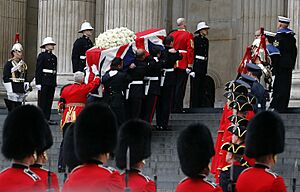
Margaret Thatcher died on 8 April 2013, at the age of 87, after suffering a stroke. She received a ceremonial funeral with full military honours at St Paul's Cathedral on 17 April. Queen Elizabeth II attended the funeral. This was only the second time the Queen had attended the funeral of a former prime minister.
After the service, Thatcher's body was cremated. Her ashes were later buried next to her husband's at the Royal Hospital Chelsea.
Legacy and Impact
Political Impact
Thatcherism brought big changes to Britain. It moved away from the post-war agreement where governments had a large role in the economy. She focused on reducing government control, lowering taxes, and selling state-owned industries.
During her time, the number of adults owning shares in companies increased. Over a million families bought their council houses, becoming homeowners. Personal wealth also grew.
However, the "Thatcher years" also saw periods of high unemployment and social unrest. Critics argue that her economic policies caused job losses and social problems in many areas.
Thatcher did not focus on promoting women's political careers within her party. Some feminists criticized her for not actively supporting women's rights.
Her policies also influenced the Labour Party. When Tony Blair became Labour leader in 1994, he rebranded the party as "New Labour". He aimed to appeal to a wider range of voters, including those who had supported Thatcher. Thatcher herself reportedly saw "New Labour" as her greatest achievement.
Reputation
Margaret Thatcher served as British prime minister for 11 years and 209 days. This was the longest continuous period in office since the early 1800s. She led the Conservative Party to victory in three general elections.
In a 2002 BBC poll, she was ranked highest among living persons in the "100 Greatest Britons" list. Time magazine also named her one of the 100 most important people of the 20th century. In 2015, she topped a poll as the most influential woman of the past 200 years.
While her average approval rating as prime minister was not always high, she is often viewed positively in later public opinion polls. Many Britons consider her one of Britain's greatest post-war leaders.
Cultural Depictions
Margaret Thatcher had a big impact on the arts. She was often satirized in TV shows like Spitting Image. Musicians like Billy Bragg wrote protest songs about her. The chant "Maggie Out" became a popular rallying cry for those who opposed her policies.
She has been portrayed in many television shows, documentaries, and films. Actresses like Meryl Streep (in The Iron Lady) and Gillian Anderson (in The Crown) have played her.
Titles, Awards, and Honours
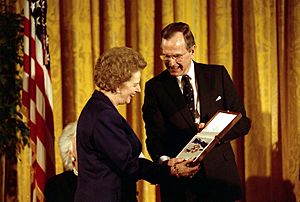
Margaret Thatcher became a privy counsellor in 1970. This is a group of advisors to the Queen.
As prime minister, she received several honours:
- Honorary Fellowship of the Royal Institute of Chemistry in 1979.
- Fellowship of the Royal Society (FRS) in 1983.
Two weeks after she resigned as prime minister, the Queen appointed her a Member of the Order of Merit (OM). Her husband, Denis, was also made a hereditary baronet at the same time.
In the Falkland Islands, "Margaret Thatcher Day" is celebrated every 10 January. This marks her first visit to the islands in 1983, after the Falklands War.
Thatcher became a member of the House of Lords in 1992 as Baroness Thatcher. In 1995, she was appointed a Lady Companion of the Garter (LG), which is the highest order of chivalry.
In the US, she received the Ronald Reagan Freedom Award in 1998. In 2007, she became the first living British prime minister to have a statue in the Houses of Parliament. She joked that she might have preferred iron, but bronze would do.
Published Works
- (1993). The Downing Street Years. HarperCollins. ISBN 978-0-00-255049-9.
- (1995). The Path to Power. HarperCollins. ISBN 978-0-00-255050-5.
- (2003). Statecraft: Strategies for a Changing World. Harper Perennial. ISBN 978-0-06-095912-8.
Images for kids
See also
 In Spanish: Margaret Thatcher para niños
In Spanish: Margaret Thatcher para niños
- Economic history of the United Kingdom
- List of elected and appointed female heads of state and government
- Political history of the United Kingdom (1979–present)
- Social history of the United Kingdom (1979–present)
 | DeHart Hubbard |
 | Wilma Rudolph |
 | Jesse Owens |
 | Jackie Joyner-Kersee |
 | Major Taylor |


